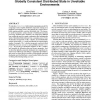Free Online Productivity Tools
i2Speak
i2Symbol
i2OCR
iTex2Img
iWeb2Print
iWeb2Shot
i2Type
iPdf2Split
iPdf2Merge
i2Bopomofo
i2Arabic
i2Style
i2Image
i2PDF
iLatex2Rtf
Sci2ools
223
click to vote
POPL
2005
ACM
2005
ACM
Transactors: a programming model for maintaining globally consistent distributed state in unreliable environments
We introduce transactors, a fault-tolerant programming model for composing loosely-coupled distributed components running in an unreliable environment such as the internet into systems that reliably maintain globally consistent distributed state. The transactor model incorporates certain elements of traditional transaction processing, but allows these elements to be composed in different ways without the need for central coordination, thus facilitating the study of distributed fault-tolerance from a semantic point of view. We formalize our approach via the -calculus, an extended lambdacalculus based on the actor model, and illustrate its usage through a number of examples. The -calculus incorporates constructs which distributed processes can use to create globally-consistent checkpoints. We provide an operational semantics for the -calculus, and formalize the following safety and liveness properties: first, we show that globally-consistent checkpoints have equivalent execution traces ...
Equivalent Execution Traces | Globally-consistent Checkpoints | POPL 2005 | Programming Languages | Traditional Transaction Processing |
| Added | 03 Dec 2009 |
| Updated | 03 Dec 2009 |
| Type | Conference |
| Year | 2005 |
| Where | POPL |
| Authors | John Field, Carlos A. Varela |
Comments (0)

